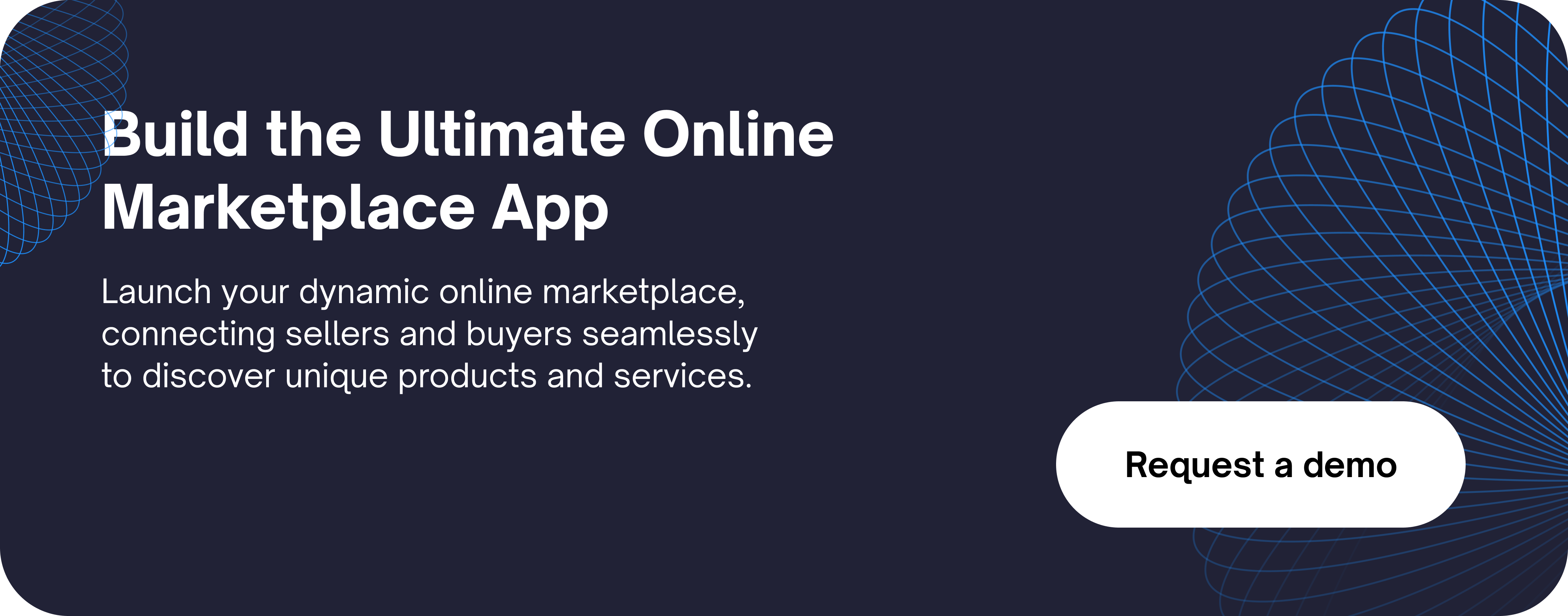In the dynamic world of digital commerce, marketplace apps are rapidly transforming the landscape, offering unique opportunities for entrepreneurs to tap into burgeoning markets. The global BOPIS market is projected to reach $703.18 billion by 2027, growing at a CAGR of 19.3%. This trend underscores the enduring appeal of convenience-driven shopping experiences.
Mobile commerce is another significant trend driving the growth of marketplace apps. With over 40.4% of ecommerce sales expected to come from mobiles in 2024, the importance of mobile-friendly platforms cannot be overstated. These trends highlight the immense growth and potential of marketplace apps, making them a lucrative venture for entrepreneurs looking to innovate and thrive in the digital economy.
Benefits of Marketplace App Development
Benefits for Customers
Wide Selection of Products and Services: Customers have access to a vast array of products or services on a single platform, providing them with more choices and convenience.
Ease of Comparison: Marketplaces allow customers to easily compare products, prices, and reviews, helping them make informed purchasing decisions.
Anytime Operating Facility: Unlike physical stores, online marketplaces operate 24/7, allowing customers to shop at their convenience.
Enhanced Trust and Safety: User reviews and ratings build a sense of trust and security within the community, fostering a reliable shopping environment.
Mobile Accessibility: With the rise of mobile commerce, customers can shop from anywhere using their mobile devices, making the process seamless and efficient.
Benefits for Sellers
Increased Reach: Sellers gain access to a broad and diverse customer base, expanding their market presence and potential sales without geographical limitations.
Efficiency and Automation: Marketplaces streamline transactions and automate many business processes, reducing the need for manual intervention and paperwork.
Cost-Effective: Sellers can leverage existing platforms, avoiding the costs associated with creating and maintaining an independent online store.
Scalable Business Model: Sellers can expand their business without the need to manage inventory directly, as the marketplace handles logistics and inventory management.
Analytics and Insights: Access to detailed analytics helps sellers understand customer behaviour, optimise their offerings, and run targeted marketing campaigns.
Benefits for Entrepreneurs
Scalable and Flexible Business Model: The marketplace model allows for scalability with minimal financial risks, as there is no need to maintain inventory or manage physical logistics.
Multiple Revenue Streams: Entrepreneurs can earn through various models, including commissions on transactions, subscriptions, listing fees, and advertising.
Improved Customer Retention: Features like easy registration, secure payment systems, and effective search capabilities enhance user experience and retention.
Community Engagement: Marketplaces often foster a sense of community, allowing entrepreneurs to build strong relationships with both buyers and sellers.
Data-Driven Decision Making: Access to comprehensive data and analytics enable entrepreneurs to make informed business decisions, improving overall platform performance and profitability.
The Steps For Marketplace App Development
Developing a marketplace app involves multiple stages, each requiring careful planning and execution.
Define the Marketplace Type and Goals
Identify the Marketplace Model: Determine whether your marketplace will be P2P, B2C, or B2B, and whether it will focus on goods, services, or both.
Set Clear Objectives: Establish specific goals, such as target audience, compliance, scalability, and user experience.
Choose the Right Tech Stack
Programming Languages and Frameworks: Select languages and frameworks that best suit your project needs, such as JavaScript with Express.js, or Python with Django. Include a relational SQL database like PostgreSQL or MySQL.
Backend and Frontend Technologies: Use a backend framework to handle authentication, HTTP requests, routing, and database management, and choose frontend technologies like React or Angular for a responsive UI.
Design UX and UI
Wireframes and Prototypes: Create wireframes to visualise the app’s interface and develop prototypes to test the user journey and interactions.
Focus on Accessibility and Responsiveness: Ensure the design is user-friendly, accessible, and responsive across different devices.
Develop Core Features
User Profiles and Account Management: Implement systems for user registration, profile management, and authentication.
Listing Management: Develop functionality for users to create, edit, and manage listings.
Search and Filtering: Build advanced search and filtering options to help users find products or services easily.
Transaction Process and Payment Integration: Set up secure payment gateways and manage transaction workflows.
Implement Advanced Features
Booking and Availability Management: For service-based marketplaces, integrate booking systems and manage availability.
Communication Channels: Enable messaging between buyers and sellers for better interaction.
Review and Rating System: Allow users to leave reviews and ratings to build trust within the community.

Monetisation Strategy
Commission, Subscriptions, and Listing Fees: Decide on the monetisation model that suits your business, such as taking a commission on transactions, offering subscription plans, or charging listing fees.
Testing and Quality Assurance (QA)
Comprehensive Testing: Conduct thorough testing, including unit, functional, performance, security, compatibility, and usability testing to ensure the app functions smoothly.
User Feedback and Iteration: Collect feedback from beta testers and make necessary adjustments to improve the app.
Launch and Post-Launch Activities
Final Preparations: Complete final testing, set up hosting, and ensure all systems are monitored for errors and performance.
Marketing and User Acquisition: Develop and execute a marketing strategy to attract users and drive engagement.
Ongoing Support and Maintenance: Provide continuous support, regular updates, and scale the platform as needed.
Making Money From Marketplace Apps
Monetising a marketplace app involves selecting the right strategies to generate revenue. Here are several effective methods to consider:
Commission Model
The marketplace charges a fee for every transaction completed on the platform.
Types of Commission Fees:
- Charging the vendor for each transaction.
- Charging the buyer for each successful payment.
- Charging both buyer and seller for each transaction.
Listing Fees
Sellers pay a fee to list their products or services on the marketplace, irrespective of sales. It ensures revenue regardless of sales performance. It is suitable for peer-to-peer marketplaces.
Subscription Model
Users (sellers, buyers, or both) pay a recurring fee to access the marketplace’s services. It provides a predictable revenue stream and can include additional benefits like premium features or reduced transaction fees.
Advertising
Selling ad space to third-party vendors or promoting products within the marketplace. This generates additional revenue without charging users directly. It also enhances product visibility for sellers.
Lead Fees
Service providers pay to bid on or respond to client requests posted on the marketplace. It attracts service providers by providing access to qualified leads.
Selling Data and Analytics
Monetising by selling aggregated data and insights to sellers or third parties. It utilises existing data to generate revenue and provides valuable insights to improve seller performance.

Factors Influencing Cost of Marketplace App Development
Marketplace app development can be a substantial investment, and various factors can significantly influence the overall cost. Here’s a detailed look at the key factors that impact the cost:
Complexity of Features
Basic Features: User registration, product listings, search and filtering, payment processing.
Advanced Features: Real-time chat, AI-based recommendations, advanced search algorithms, multi-language support, complex payment systems, and integrations with third-party services.
Custom Features: Unique functionalities tailored to specific business needs can increase both development time and cost.
Platform Choice
Web Only: Developing a web-based marketplace is generally less expensive than creating mobile apps.
Mobile Platforms: Developing for iOS, Android, or both increases costs. Native development (Swift for iOS, Kotlin for Android) is more expensive than cross-platform development (React Native, Flutter).
Technology Stack
Backend Technologies: The choice of backend framework (Node.js, Django, Ruby on Rails, etc.) and database (PostgreSQL, MySQL, MongoDB).
Frontend Technologies: Choices like React, Angular, or Vue.js.
APIs and Integrations: The need for third-party APIs for services like payment gateways, geolocation, and social media.
Development Team
In-House Team: Hiring full-time developers, designers, and QA engineers.
Outsourcing: Partnering with a development agency or freelancers. Costs vary based on the geographic location of the development team.
Development Time
Project Scope: Larger, more complex projects require more man-hours.
Agile vs. Waterfall: Agile projects may have ongoing costs due to iterative development and continuous improvement.
Post-Launch Costs
Maintenance and Updates: Regular updates to fix bugs, add new features, and ensure security.
Customer Support: Providing ongoing support for users.
Hosting and Infrastructure: Costs for cloud services (AWS, Google Cloud, Azure) and content delivery networks (CDNs).
Conclusion
Marketplace app development is a significant investment that involves various costs and considerations. From planning and design to development, testing, and post-launch maintenance, each step requires careful attention to detail and strategic decision-making. The complexity of features, choice of platform, technology stack, and development team all influence the overall cost. By understanding these factors, businesses can better manage their budgets and ensure a successful marketplace app development process.
If you’re looking to bring your marketplace app idea to life, partnering with experienced developers can make all the difference. Appscrip offers marketplace app development solutions tailored to your unique business needs. With a proven track record and expertise in creating robust, scalable, and user-friendly marketplace apps, Appscrip is your ideal partner in this journey.
Contact Appscrip today to learn more about our marketplace app development services and how we can help you achieve your business goals.



